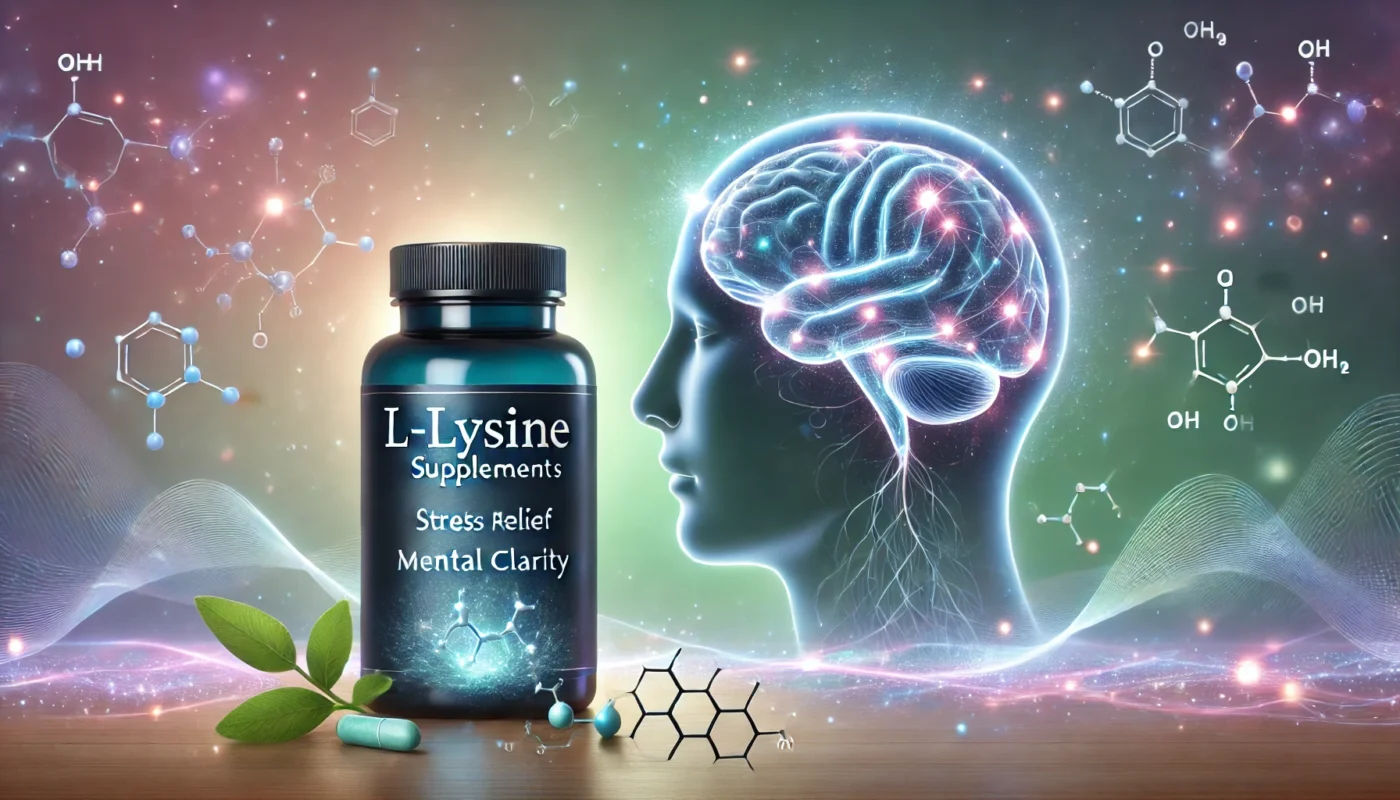In today’s fast-paced world, stress has become a near-constant companion for many. Chronic stress not only impacts physical health but also impairs mental clarity and overall well-being. While numerous solutions for stress management exist, one emerging avenue is the use of amino acids like L-lysine. L-lysine, an essential amino acid, has shown promise in regulating stress responses, balancing neurotransmitters, and supporting mental clarity.
This article delves into the scientific evidence surrounding L-lysine’s role in stress relief, focusing on its effects on neurotransmitter balance, cortisol reduction, and mental well-being.
You May Also Like:
The Science Behind L-lysine and Mental Health Support
L-lysine for Athletes: Boosting Performance and Recovery Naturally
L-lysine for Stress Relief and Mental Clarity: What the Studies Say is an original (HSLHealing) article.
What is L-lysine?
L-lysine is an essential amino acid, meaning it cannot be synthesized by the body and must be obtained through diet or supplementation. Found abundantly in high-protein foods such as meat, dairy, and legumes, L-lysine plays a critical role in protein synthesis, immune function, and collagen production. Recent research has also highlighted its potential benefits for mental health, particularly in stress regulation.

The Connection Between Stress and Amino Acids
Stress triggers the activation of the hypothalamic-pituitary-adrenal (HPA) axis, leading to the release of cortisol, the primary stress hormone. While acute stress responses are protective, chronic stress can dysregulate the HPA axis, resulting in heightened cortisol levels and impaired neurotransmitter balance.
Amino acids like L-lysine are precursors to neurotransmitters and play a vital role in maintaining mental stability. For instance:
- Balancing GABA: L-lysine may enhance the activity of gamma-aminobutyric acid (GABA), an inhibitory neurotransmitter that promotes relaxation.
- Regulating Serotonin: L-lysine has been linked to modulation of serotonin pathways, which are crucial for mood regulation and stress response.
How L-lysine Affects Neurotransmitters
Research shows that L-lysine interacts with key neurotransmitters in the brain, aiding in stress reduction and mental clarity.
L-lysine and GABA
GABA is often referred to as the brain’s “brake pedal” due to its calming effects. A study published in Nutrition Neuroscience (2007) found that L-lysine supplementation increased GABA receptor sensitivity, leading to a reduction in anxiety-like behaviors in participants.
L-lysine and Serotonin
L-lysine appears to influence serotonin, a neurotransmitter that regulates mood, appetite, and sleep. By reducing serotonin activity in stress-related pathways, L-lysine can mitigate physiological stress responses without suppressing normal serotonin function.

The Impact of L-lysine on Cortisol Levels
Elevated cortisol levels are a hallmark of chronic stress. Prolonged high cortisol levels can impair cognitive function, weaken the immune system, and disrupt sleep.
A 2010 study published in Biomedical Research investigated the effects of L-lysine and L-arginine supplementation on cortisol levels in individuals under acute stress. Participants taking a combination of these amino acids exhibited significantly lower cortisol levels compared to the placebo group.
Clinical Evidence Supporting L-lysine for Stress Relief
Several studies have explored the potential benefits of L-lysine in managing stress and improving mental well-being:
- Reduced Anxiety in Healthy Adults
A study in Proceedings of the National Academy of Sciences (2004) evaluated the effects of L-lysine supplementation in 108 healthy participants. The results showed a marked reduction in state anxiety and baseline cortisol levels after just one week of supplementation.
- Stress Reduction in Vulnerable Populations
A 2007 study conducted in rural areas of Syria found that L-lysine-enriched wheat flour reduced anxiety symptoms in individuals facing food insecurity. The researchers attributed this to L-lysine’s ability to modulate the stress response, highlighting its utility in low-resource settings.
- Improved Cognitive Performance
In addition to stress relief, L-lysine has been associated with enhanced cognitive performance. A 2021 review in Nutrients suggested that amino acids like L-lysine could improve focus and mental clarity by reducing the effects of stress on cognitive processes.

L-lysine for Mental Clarity
Beyond its calming effects, L-lysine supports cognitive function by reducing distractions caused by stress. Here’s how:
- Enhanced Concentration
By lowering cortisol levels, L-lysine helps prevent the cognitive impairments associated with chronic stress, such as memory lapses and poor concentration.
- Improved Sleep Quality
Sleep disturbances are a common consequence of stress. L-lysine’s calming effects on the nervous system can improve sleep quality, which is crucial for optimal brain function.
- Neuroprotective Benefits
Chronic stress can lead to neuronal damage. L-lysine may offer neuroprotective effects by stabilizing stress-related pathways and reducing oxidative stress.
How to Incorporate L-lysine into Your Routine
Dietary Sources
Natural sources of L-lysine include:
- Animal Proteins: Eggs, chicken, beef, and fish.
- Dairy Products: Milk, yogurt, and cheese.
- Plant-Based Foods: Lentils, quinoa, and soy products.
Supplementation
For stress management and mental clarity, L-lysine supplements may be beneficial. Most studies recommend a dosage of 500–3,000 mg per day, depending on individual needs.

Potential Side Effects and Considerations
L-lysine is generally well-tolerated, but excessive intake may lead to gastrointestinal discomfort or imbalances with other amino acids. It is essential to consult a healthcare provider before starting supplementation, particularly for individuals with pre-existing medical conditions or those taking medications.
Future Directions in L-lysine Research
While current studies highlight L-lysine’s potential for stress relief and mental clarity, more research is needed to fully understand its mechanisms and long-term effects. Future investigations may explore its role in:
- Managing clinical anxiety disorders.
- Enhancing resilience to chronic stress.
- Supporting cognitive function in aging populations.
Conclusion
L-lysine offers a promising, natural approach to managing stress and improving mental clarity. By balancing neurotransmitters, reducing cortisol levels, and enhancing cognitive performance, it addresses both the physical and psychological components of stress.
Whether obtained through diet or supplementation, L-lysine is a valuable tool for those seeking to navigate life’s challenges with greater calm and focus.

References
- Lysine fortification reduces anxiety and lessens stress in family members in economically weak communities in Northwest Syria. Retrieved from: https://pubmed.ncbi.nlm.nih.gov/15159538/
- A diet fortified with L-lysine and L-arginine reduces plasma cortisol and blocks anxiogenic response to transportation in pigs. Retrieved from: https://pubmed.ncbi.nlm.nih.gov/14609314/
- Oral treatment with L-lysine and L-arginine reduces anxiety and basal cortisol levels in healthy humans. Retrieved from: https://pubmed.ncbi.nlm.nih.gov/17510493/
- Dietary L-lysine deficiency increases stress-induced anxiety and fecal excretion in rats. Retrieved from: https://pubmed.ncbi.nlm.nih.gov/12468617/
- Amino Acid and Protein Requirements: Cognitive Performance, Stress, and Brain Function. Retrieved from: https://www.ncbi.nlm.nih.gov/books/NBK234922/
Important Note: The information contained in this article is for general informational purposes only, and should not be construed as health or medical advice, nor is it intended to diagnose, prevent, treat, or cure any disease or health condition. Before embarking on any diet, fitness regimen, or program of nutritional supplementation, it is advisable to consult your healthcare professional in order to determine its safety and probable efficacy in terms of your individual state of health.
Regarding Nutritional Supplements Or Other Non-Prescription Health Products: If any nutritional supplements or other non-prescription health products are mentioned in the foregoing article, any claims or statements made about them have not been evaluated by the U.S. Food and Drug Administration, and such nutritional supplements or other health products are not intended to diagnose, treat, cure, or prevent any disease

